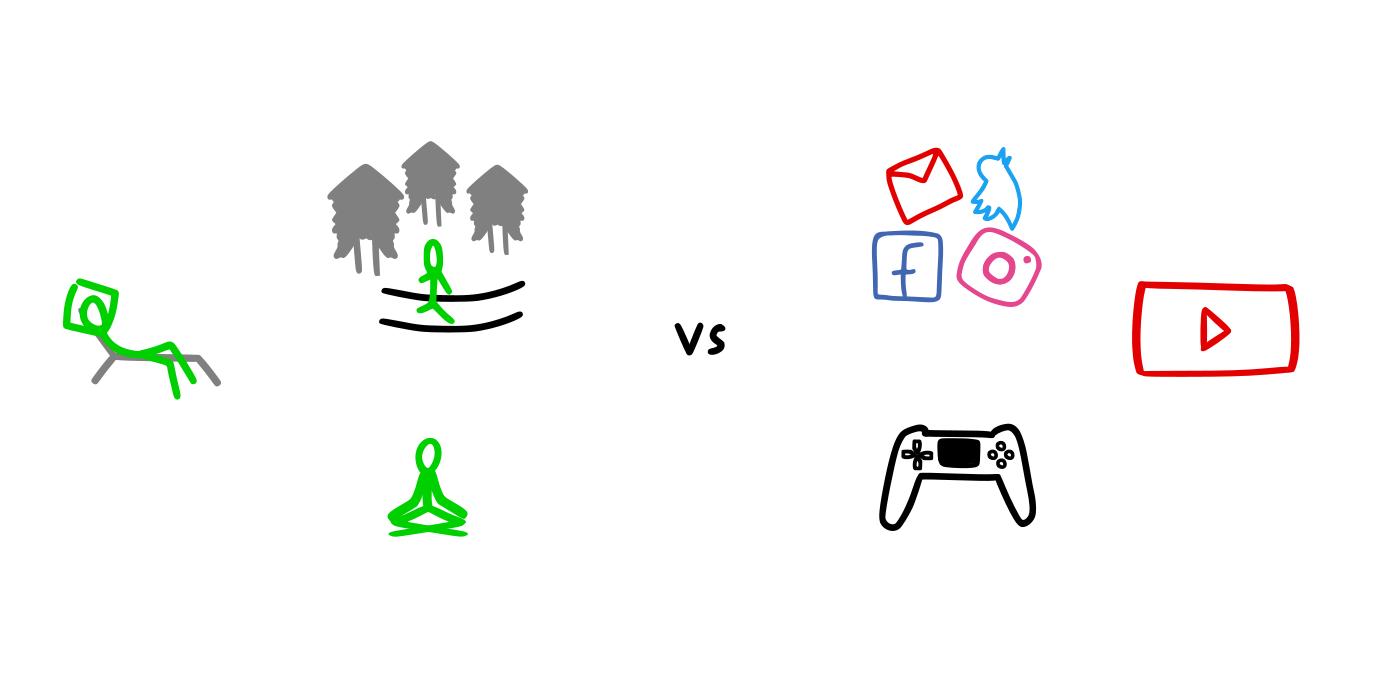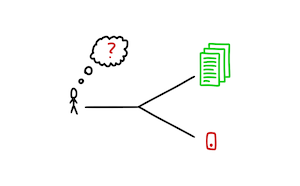Are you really relaxing or just numbing yourself?

One of the most common objections to eliminating procrastination is that people deserve to relax.
We agree with that. However, people often pursue things that look like relaxing but they are in fact just numbing.
“I deserve to relax” often serves as a justification for compulsive or addictive behavior.
You probably know a person who drinks alcohol or smokes weed every evening because they have to destress after a long day at work.
This is a case of mistaking relaxation for self-numbing. When you drink alcohol, it makes you relaxed but you feel depressed later. We feel worse in the long run, not to mention that it has serious health consequences.
Numbing ourselves voluntarily
I don’t know when and why, but I somehow started believing that relaxing = not doing anything. If I’m doing something, then it must mean I’m not relaxing. I don’t think I’m alone in that.
However, nowadays when people say they are “not doing anything” it often means that they are consuming entertainment on their various devices. This type of “not doing anything” quickly turns into numbing.
People often don’t watch re-runs of Friends or The Big Bang Theory on Netflix for the pure enjoyment of it, they watch it to not think about anything stressful, to occupy their mind until they doze off. (Sidenote: there is another form of “not doing anything” that entails getting bored and sitting with your thoughts, and this we fully endorse).
Binge-watching TV shows or playing video games long into the night is numbing your brain by releasing too much dopamine at once. Dopamine reduces pain and discomfort.
Personally, I don’t feel relaxed after scrolling social media, binge-watching a Netflix series, or playing a video game for too long.
No, I actually feel my brain is fried and I don’t want to do anything else or anything at all. And that is exactly the nature of dopamine and pain vs pleasure balance.
Yes, relaxing is good. However, it doesn’t mean we’re supposed to not do anything and just stare at a screen.
Because when we believe this, we end up in this weird state:
I’m relaxing → I don’t have to do anything and can’t be bothered → lying on the couch, consuming Netflix, playing video games, eating junk food.
How did we get to this place?
Why did we create this false dichotomy of either working or not doing anything? We could write a whole book on this topic, but to cut long story short:
Because of multiple different reasons, a lot of people believe that relaxing = bliss.
The way our modern life is structured, old people get to retire after a long grueling work life, so they finally deserve their rest.
At school and from our parents, we heard all the time - work is hard and you have to work hard, otherwise, you’ll fail. Only after you finish homework, you get to have fun.
This message is supported by marketing telling us we deserve to relax. You’re tired - you deserve to order food delivery… Buy this lottery ticket and be forever happy relaxing on the beach like these people in our commercial.
Then it’s no wonder that plenty of people see relaxation as the end goal. It’s something that must be amazing in comparison to the annoying things we do at work. Especially, because we can’t get enough of bliss due to having to take care of all the responsibilities of life.
In reality, people who’ve achieved the financial means and could hypothetically relax and do nothing for the rest of their life usually come back and start working once again. Why? Because they find out that doing nothing on a beach isn’t the end goal. It’s actually boring after a while.
People who achieve this via living frugally (like this guy) don’t just sit on their butts & do nothing - instead, they spend their energy on projects of their own choosing.
In a healthy life-work balance, relaxation is a part of the process that is necessary and should be planned often. It’s a piece of the puzzle to achieve a satisfying life. But again, relaxation is not the same as numbing yourself with highly dopaminergic activities.
How to stop numbing yourself and start relaxing
Relaxing = rest from work or engaging in an enjoyable activity so as to become less tired or anxious
By definition numbing activities make us feel less tired or anxious only for a little bit, but they make us feel worse in the end. When you binge-watch a TV series, you don’t really feel relaxed or particularly alive. However, when you take a nap or have lunch with a friend, you often do.
So here are some guidelines we can follow to relax better.
A good rule of thumb is to minimize cheap dopamine.
Cheap dopamine is dopamine you get without any effort required on your end - basically when you consume entertainment on your screen. It’s okay to do it once in a while, but it shouldn’t be your default leisure activity.
What is relaxing is subjective, and depends how you think about it.
For one person, cooking is a chore, for another person it’s fun to try new recipes.
Look for activities that interest you but don’t have any significant negative consequences. Now, let’s not pretend. Playing video games is usually super fun, but it also leads people to sabotage their sleep and spend a lot of time thinking about doing nothing but gaming, which can have a serious effect on productivity.
When you don’t know what to do, look for something that doesn’t involve staring at a screen.
Go for a walk, call up a friend, or even stare out of a window for a moment.
Explore new relaxing activities.
They don’t have to be as stimulating as video games, because they can bring you great satisfaction instead.
High quality relaxing activities might not be pure bliss in the beginning but they come with a satisfaction that isn’t found in the cheap dopamine ones. Imagine how great it feels when you cook good food for your guests and they like it.
We call this high-quality leisure.
Activities that are fun and make you relax, recharge, or improve the quality of your life fall into that category
Don’t try to replace cheap dopamine with work.
Before we wrap up, one common mistake is that people try to replace mindless surfing with being productive. But here’s the thing: binge-watching, social media scrolling, etc - they do serve a function: they allow us to not think about work. If we try to work instead of scrolling, it often leads to burnout and not feeling motivated to do any work. So don’t try to be productive 24/7.
To sum it up, don’t numb yourself. Don’t let scrolling or watching become your go-to way to spend your free time. If it already is your default go-to, read about how to get rid of it. Instead, actually relax by engaging in high-quality leisure activities.



